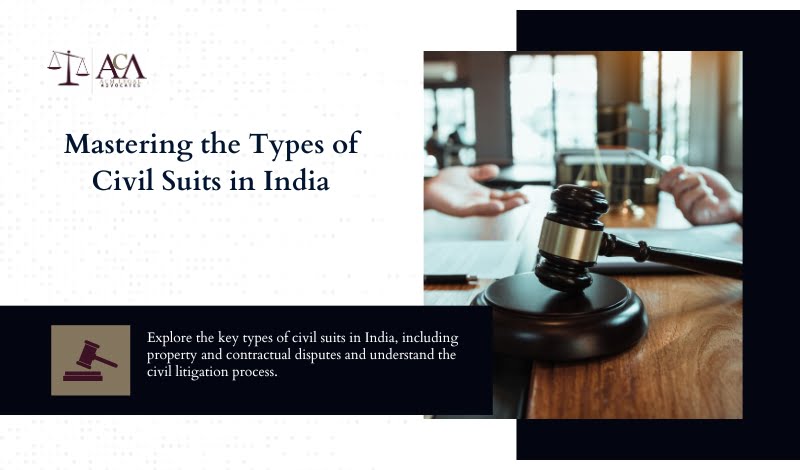A civil suit is a legal dispute between individuals or entities seeking resolution through the judicial system. Unlike criminal cases, which involve the state prosecuting an individual for alleged crimes, civil suits typically address private conflicts such as breaches of contract, property disputes, or personal injuries. There are types of civil suits in India that deal with various matters.
In India, a civil suit is a legal action initiated by an individual or entity to resolve non-criminal disputes, such as issues related to contracts, property, or personal injury. These suits are filed in civil courts, which handle cases that seek remedies like compensation, injunctions, or specific performance.
Understanding the different types of civil suits in India is crucial as it allows individuals and businesses to effectively navigate the legal system and address specific legal issues. Each civil case type in India, whether it concerns contract disputes, property rights, or personal injury, has its own procedural requirements and legal standards.
What are Civil Suits?
There are different types of civil suits in India and a general understanding of civil suits is that it’s a process where the plaintiff sues the defendant for damages. The process of civil case types in India begins with the filing of a plaint, followed by a series of procedural steps including summons, written statements, and hearings. The goal is to provide a fair resolution to disputes based on legal principles and evidence, as outlined in the Code of Civil Procedure, 1908, which governs the civil litigation process in India.
Key differences between civil and criminal cases.
Purpose: –
Criminal: To address offenses against the state or society, seeking to punish the defendant and deter future crimes.
Civil: To resolve disputes between individuals or entities, often involving compensation for harm or enforcing legal rights.
Parties Involved: –
Criminal: The state (prosecution) vs. the accused (defendant).
Civil: Private parties, where one party (plaintiff) sues another (defendant).
Punishment: –
Criminal: Penalties may include imprisonment, fines, or community service.
Civil: Outcomes typically involve monetary damages or specific performance to resolve the dispute.
Common Types of Civil Suits in India
Property Disputes
One of the types of civil suits in India is property disputes, it refers to legal disagreements that arise over the ownership, use, or boundaries of real estate or other tangible assets. Common issues are ownership disputes where parties disagree over who holds legal rights to property, partition suits where legal action is taken to divide jointly owned property and, encroachment issues where one party unlawfully extends their use over another party’s property.
Contractual Disputes
A contractual dispute is a type of civil suits in India which arises when parties disagree over the terms or performance of a contract. The affected party may seek remedies like specific performance, damages, or contract rescission through legal proceedings. The court reviews the contract terms and evidence to resolve the issue and enforce or correct the agreement. Types of contractual disputes are breach of contract and non-performance.
Family Law Disputes
A family law dispute in a civil suit involves legal conflicts related to family matters, such as divorce, child custody, alimony or property division. The court aims to resolve these disputes based on legal standards and the best interests of involved family members.
Tort Claims
Torts in a civil suit involve claims for harm caused by one party’s wrongful actions or negligence. Common tort claims include:
- Negligence, which is failure to exercise reasonable care, leading to injury or damage;
- Defamation, which is false statements that harm someone’s reputation;
- Assault and Battery, which is unlawful physical contact or threats;
- Trespass, which is unauthorized entry onto another’s property; and,
- Nuisance which are activities that interfere with another’s use and enjoyment of their property.
Consumer Disputes
Another type of civil suits in India is consumer dispute under which a consumer files a claim against a business or service provider for issues related to defective products, substandard services, or deceptive practices. Types of consumer disputes include:
- Product Liability: Claims for injuries or damages caused by defective or unsafe products.
- Service Quality: Disputes over inadequate or faulty services not meeting contractual terms.
- Breach of Warranty: Claims when a product or service fails to meet promised standards or guarantees.
- Fraud or Misrepresentation: Allegations that the business misled the consumer through false information or deceptive practices.
Steps Involved in Filing a Consumer Suit
Consumer protection laws are designed to safeguard buyers from unfair practices and ensure a fair marketplace, promoting trust between consumers and businesses. These laws address various facets of commerce, including misleading advertising, defective products, and financial practices that may exploit consumers. It aims to prevent unethical practices that harms consumers.
Procedure for Filing a Civil Suit in India
Step 1: Filing of Plaint
Step 2: Issuing of Summons
Step 3: Appearance of the Parties
Step 4: Interlocutory Proceedings
Step 5: Written Statement
Step 6: Examination
Step 7: Framing of Issues
Step 8: Documents required
Step 9: Inspection and Discovery of Documents
Step 10: Producing Required Documents
Step 11: Examination and Cross-Examination of Witnesses
Step 12: Argument
Step 13: Judgment
Step 14: Appeal, Review & Revision
Important documents required for types of civil suits in India
To support a civil case types in India, generally relevant documents, such as contracts, receipts, or correspondence, that substantiate your claims are required. Additionally, witness testimonies, expert opinions, and any physical evidence pertinent to the dispute can strengthen the case.
Timelines and court processes
The duration for resolving a civil suit in India can vary widely. Civil matters are expected to be disposed within 3 years.
Why do you need a Civil Litigation Lawyer in India to File a Civil Suit?
Hiring a civil litigation lawyer in India is essential for effectively navigating the complexities of the legal system when filing a civil suit. Their expertise not only increases the likelihood of a favorable outcome but also ensures that the rights of the parties involved are protected throughout the litigation process in different types of civil suits in India. Civil litigation lawyers in India possess in-depth knowledge of the legal procedures and rules required to file a civil suit in India. Their understanding of the Code of Civil Procedure, 1908, assists in ensuring that all necessary documents are prepared and filed correctly within the stipulated time limits.
Conclusion
In conclusion, different types of civil suits in India address a variety of non-criminal disputes, such as those involving contracts, property, and family matters, governed by the Civil Procedure Code, 1908. Navigating these cases, civil litigation lawyer in India requires the expertise, who can provide essential legal representation and advice. Their role is crucial in managing case complexities and ensuring fair resolutions.
Explore ACM Legal’s Expertise in Civil Litigation
Navigate the complexities of civil litigation with the expertise of ACM Legal. Our team of dedicated civil litigation lawyers in India is well-equipped to handle the diverse types of civil suits in India. Whether you’re facing a property dispute, contractual disagreement, or any other civil case types in India, ACM Legal provides strategic legal solutions tailored to your specific needs.
FAQs on Types of Civil Suits in India
1. What are the key differences between civil suits and criminal cases in India?
Criminal suits prosecute offenses against the state, with outcomes including imprisonment or fines, and civil suits resolve disputes between private parties, often leading to compensation or performance. Criminal cases are initiated by the state, while civil cases are brought by individuals.
2. What types of property disputes are commonly addressed in civil suits?
Among different types of civil suits in India, the common property disputes addressed in civil suits include issues related to property ownership, boundary conflicts, inheritance claims, disagreements over title, possession, or the division of property.
3. What are the most common contractual disputes that lead to civil suits in India?
The most common contractual disputes amongst types of civil suits in India involve breaches of contract, such as failure to perform agreed terms or non-payment for services or goods. Other frequent issues include disputes over contract interpretation and execution, leading parties to seek remedies like damages or specific performance through legal proceedings.
4. What is the procedure for filing a civil suit in India?
Upon understanding types of civil suits in India, filing would involve drafting a plaint outlining the claim, submitting it to the appropriate court, and paying the requisite court fees. The court then issues a summons to the defendant, who must respond. The process includes filing written statements, presenting evidence, and possibly attending hearings before a judgment is rendered.
5. Why is it important to hire civil litigation lawyers when filing a civil suit in India?
Hiring civil litigation lawyers in India is crucial for effectively navigating the complexities of the legal system, ensuring proper case preparation, and presenting a strong argument in court. Their expertise helps in adhering to procedural norms and increasing the chances of a favourable outcome.
Author: Eccha Shukla, Senior Associate
Co-Author: Divya Singh, Intern






